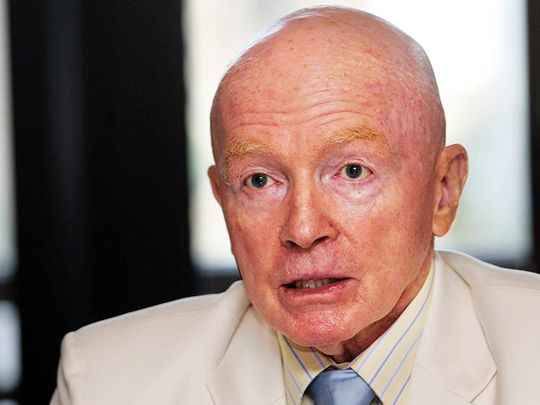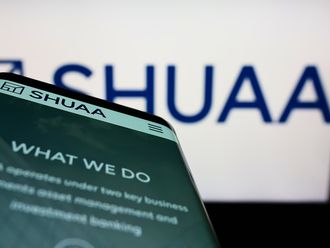
DUBAI
As Saudi Arabia stands poised to win emerging-market status, one of the best-known developing-nation investors says he isn’t completely convinced the kingdom’s stocks are a good option.
During his 40 years working in emerging markets, Mark Mobius has gained a reputation for being optimistic more often than not on their prospects. He recently sounded less upbeat and his views aren’t positive on the biggest stock exchange in the Middle East. The kingdom is expected to earn emerging-market status from index compiler MSCI Inc next week, three years after it opened its equity markets directly to foreigners.
“We are not necessarily bullish on Saudi stocks, simply because the range of offerings is limited and a number of restrictions are still in place,” said Mobius, 81, who recently set up Mobius Capital Partners LLP after three decades at Franklin Templeton Investments. “Many difficulties remain for Saudi market entry.”
Before Saudi Arabia invited foreigners to trade directly on its bourse, it was viewed among the most restricted markets in the world. Attracting investors has been part of the government’s broader economic plan to reduce reliance on income from oil. But foreign ownership of stocks remains low and the value of trading on the bourse is weaker than before it was opened to outsiders on June 15, 2015.
MSCI is due to announce on June 20 whether it will add the country to its emerging markets category, a move that would follow a similar decision by FTSE Russell in March. The index compiler has more over $1.9 trillion tied to its EM indexes, and even though the upgrade could lead to billions of dollars in inflows to Saudi Arabia, it won’t “necessarily be a game changer” as such, but rather “one more step towards opening” the market, Mobius said in an emailed response to questions.
Three years of changes
Crown Prince Mohammad Bin Salman is spearheading efforts to modernise Saudi society, and that includes turning the kingdom’s $523 billion stock market into a gateway for foreign investment. Foreign ownership is currently about 5 per cent under the broadest measure, a fraction of the level in established emerging markets such as Brazil, where it’s 50 per cent, and Turkey, at almost 65 per cent.
Efforts have included reducing the minimum asset threshold required from institutional investors to $500 million from initial $5 billion, as well as aligning trade settlement times on the Tadawul, as the exchange is known, with international standards and made trading rules easier for fund managers by allowing them to aggregate orders.
Mobius believes the $500 million requirement is still high, as it “eliminates many investors and restricts the potential liquidity of the market.” A restriction on foreigners to hold no more than 49 per cent of a company’s listed securities is a further brake on investment.
Saudi stock market reforms were largely aimed at fulfilling the requirements of index compilers such as MSCI and FTSE Russell. The Tadawul All Share Index has risen 14 per cent in 2018 amid bets those changes will lead to status upgrades, with foreign inflows to stocks positive almost every week this year. That compares with a loss of 2.8 per cent for the MSCI EM Index.










